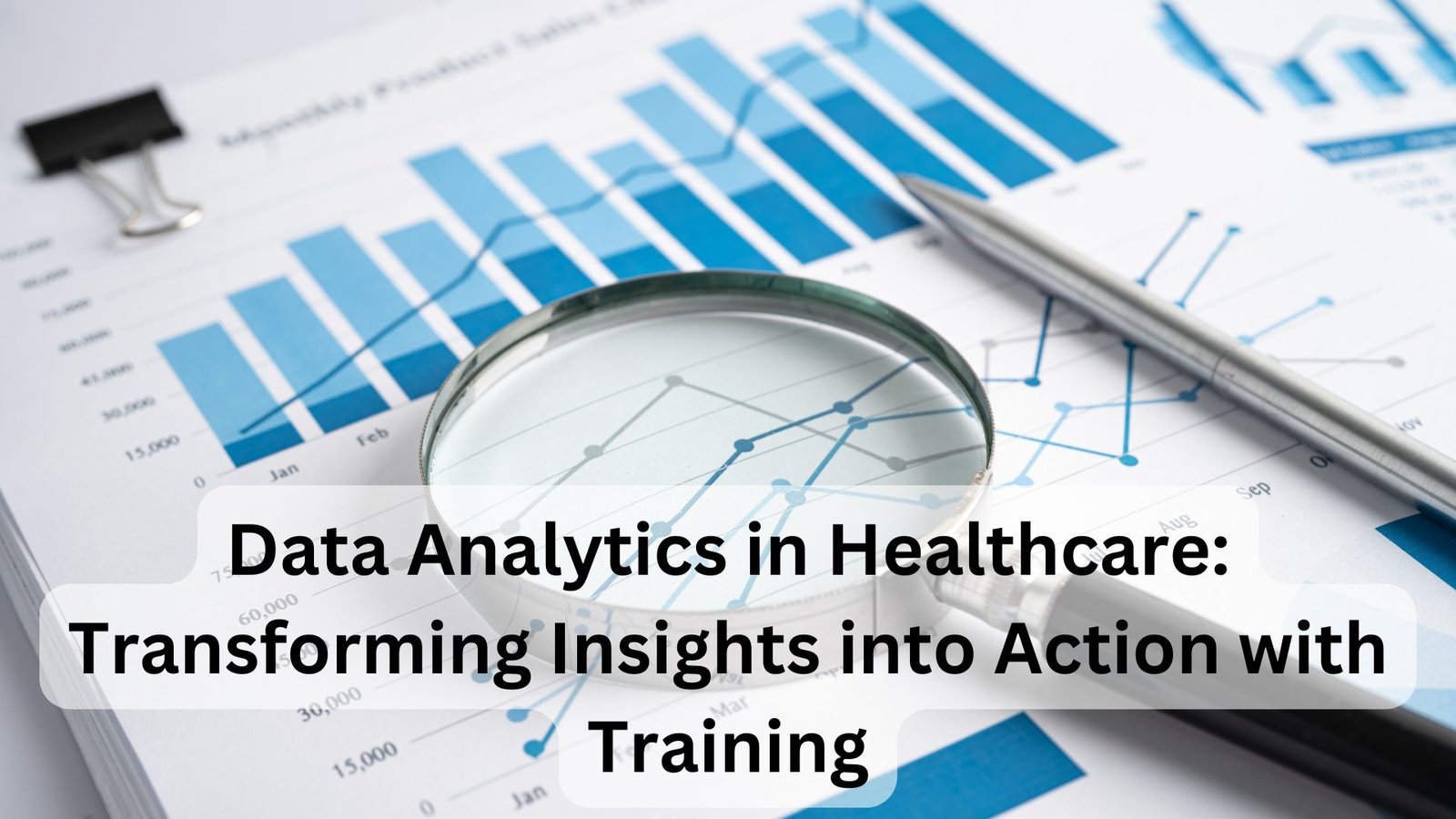Introduction to Data Analytics in Healthcare
Data analytics has become an integral part of the healthcare industry, enabling institutions to harness the power of data for better decision-making and improved patient outcomes. With the exponential growth of healthcare data, from electronic health records (EHRs) to wearable devices, the potential for insights that can drive improvements in care, efficiency, and innovation has never been greater. Data analytics empowers healthcare providers to shift from reactive to proactive models of care, where decisions are informed by real-time data, historical trends, and predictive models.
However, the true potential of data analytics can only be unlocked when healthcare professionals are trained to interpret and act on these insights. Training plays a pivotal role in transforming raw data into actionable information that can directly influence patient care, streamline hospital operations, and enhance resource management. Without adequate training, the abundance of data remains untapped or, worse, misinterpreted, leading to missed opportunities for improving healthcare systems. This article will explore how healthcare can leverage data analytics through proper training, leading to actionable insights that drive meaningful change.
Key Benefits of Data Analytics in Healthcare
The application of data analytics in healthcare delivers multiple benefits, primarily in three critical areas: patient care, cost management, and operational efficiency.
One of the most significant advantages is enhancing patient care. By using predictive analytics and machine learning models, healthcare providers can identify potential health issues before they become severe, offering personalized treatment plans based on individual patient data. This level of care customization leads to better patient outcomes and greater patient satisfaction.
Another key benefit is reducing healthcare costs. Data analytics helps identify inefficiencies, reduce unnecessary testing, and streamline processes, ultimately lowering the financial burden on both patients and providers. Predictive models also aid in resource allocation, helping hospitals prepare for patient surges or shortages.
Finally, improving operational efficiency is a critical outcome of effective data analytics. From optimizing staff schedules to better managing hospital equipment and resources, data-driven insights help institutions run smoothly while maintaining high standards of patient care. These benefits underscore the importance of training healthcare professionals to utilize data analytics tools and techniques effectively.
Training Healthcare Professionals for Data-Driven Decision Making
For healthcare organizations to fully leverage data analytics, it is crucial to upskill their workforce. Training healthcare professionals in data-driven decision-making equips them with the tools and knowledge to analyze data, interpret trends, and make informed decisions that directly affect patient care and organizational efficiency.
Healthcare professionals, including doctors, nurses, administrators, and IT staff, must be trained in data analytics to effectively use healthcare-specific datasets. These datasets encompass patient health records, clinical trial results, and even population health data. The ability to interpret and act on such data can lead to significant improvements in patient outcomes. Furthermore, professionals trained in data analytics can better understand patterns and anomalies that might otherwise go unnoticed, leading to earlier interventions and preventive measures.
Popular training programs in healthcare data analytics include courses on data visualization, statistical analysis, and machine learning tailored to healthcare applications. Certifications from recognized organizations such as HIMSS (Healthcare Information and Management Systems Society) or universities offering specialized healthcare analytics programs are excellent options. Ultimately, the investment in training yields long-term benefits as it ensures healthcare professionals are equipped to turn complex data into actionable insights that improve care and efficiency.
Leveraging Predictive Analytics for Early Disease Detection
Predictive analytics is a game-changer in early disease detection, enabling healthcare providers to identify potential health issues before they escalate into severe conditions. By analyzing historical patient data, medical records, and other health indicators, predictive models can forecast the likelihood of diseases like diabetes, cancer, or cardiovascular conditions.
Successful examples of early detection using predictive analytics include models that predict readmission risks, allowing hospitals to take preventive measures. Moreover, predictive algorithms can detect early warning signs of conditions such as sepsis or respiratory failure.
Training healthcare professionals to interpret these predictive models is essential. They must understand not only the outputs of these models but also how to apply them in a clinical setting. Training programs should focus on developing skills to interpret data patterns, assess model accuracy, and make decisions that optimize patient care. By mastering predictive analytics, healthcare professionals can intervene earlier, reduce risks, and ultimately improve patient outcomes.
Improving Operational Efficiency Through Data Analytics
Data analytics plays a vital role in enhancing operational efficiency within healthcare organizations. By analyzing various operational datasets—such as patient flow, staffing schedules, equipment usage, and supply chain logistics—hospitals and clinics can identify inefficiencies and implement data-driven solutions.
For instance, data analytics can optimize staff schedules by predicting patient inflows based on historical trends, ensuring the right number of healthcare workers are available at peak times. Similarly, predictive models can monitor equipment usage, reducing downtime by scheduling maintenance only when necessary, thereby avoiding costly delays in patient care.
Training programs focused on healthcare operational analytics help administrators and staff develop the necessary skills to utilize data effectively. Courses on performance metrics, process improvement, and data visualization enable healthcare teams to turn raw operational data into actionable insights. With this knowledge, healthcare organizations can streamline workflows, reduce wait times, and improve the overall patient experience.
Training Healthcare Data Scientists: Bridging the Gap
The demand for healthcare data scientists is growing as more organizations recognize the value of advanced analytics in transforming patient care and operations. Healthcare data scientists are tasked with building predictive models, analyzing large datasets, and uncovering insights that can inform strategic decisions.
To meet this demand, training initiatives must bridge the gap between traditional healthcare roles and data science expertise. Training programs should focus on key skills such as statistical modeling, machine learning, and data management, all within the context of healthcare.
Programs that offer hands-on experience with real-world healthcare data are particularly valuable, as they prepare future data scientists to tackle industry-specific challenges. Additionally, interdisciplinary collaboration is essential; healthcare professionals and data scientists need to communicate effectively. Comprehensive training ensures data scientists understand the intricacies of the healthcare environment, enabling them to deliver actionable insights that drive innovation and improve patient outcomes.
Conclusion
In today’s rapidly evolving healthcare landscape, data analytics is a powerful tool for transforming insights into actionable improvements in patient care, operational efficiency, and disease prevention. However, the real potential of data analytics can only be realized when healthcare professionals are properly trained to interpret and act on the vast amounts of data generated daily.
For healthcare professionals and data scientists looking to enhance their skills, Data Analytics Training in Delhi, Ludhiana, surat, goa, etc, offers numerous opportunities. Several top institutes in Delhi provide specialized training programs tailored to healthcare analytics. These courses cover key areas like predictive modeling, data visualization, and machine learning, all with a focus on real-world healthcare applications.
By investing in high-quality training, healthcare institutions in Delhi and beyond can empower their workforce to harness the power of data, improving decision-making and patient outcomes. Through data analytics training, the healthcare industry is better equipped to face future challenges, driving innovation and ensuring that insights are transformed into impactful actions for better healthcare delivery.
You should also read this Blog:-
What Should I Expect from a Data Analytics Course?



